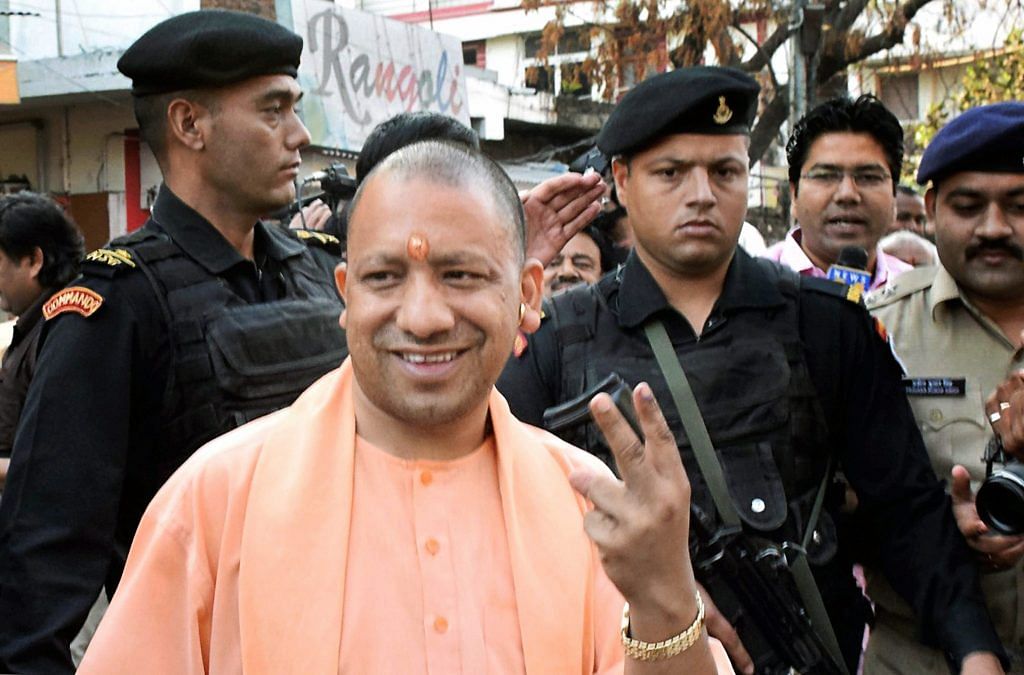The degradation of social life in Gorakhpur isn’t such a bad thing for politicians like Adityanath and Sunil Singh (former head of Hindu Yuva Vahini). There are always enough angry young men around with nothing much to do, and waiting for just the sort of muscular action that types like them offer. The saffron-draped Vahini cadre, armed with swords and sticks, made their name with vigilante violence aimed at Muslims. Its leaders were regularly charged with rioting and arson, but that only helped raise the profile of Adityanath and his Vahini, high enough to force the BJP to make him the chief minister of India’s biggest state, which has the same population as Brazil’s.
At its peak, the Vahini had more than 1.5 million members. When Adityanath became chief minister in 2017, the application for membership passed 5,000 a day. As the new chief minister needed to underplay the violent ways of his past, the Vahini began easing off on enlisting new volunteers.
There are 3 million people in Gorakhpur district, yet it has just one engineering college and university. This is how joblessness and angry disaffection are nurtured, Sunil Singh pointed out. Unemployment helped swell the ranks of Hindu Yuva Vahini, he said. ‘If you start a show in Gorakhpur, you’ll find a crowd because no one has anything better to do here.’ That’s why Singh has started his own show. It’s called Hindu Yuva Vahini Bharat, a brand-new militia that will take up where Adityanath’s private army left off. Just like its predecessor, Hindu Yuva Vahini Bharat hasn’t had problems filling its ranks. There aren’t, after all, that many recruiters in town.
Persistent unemployment leads to a drop in labour force participation rates as more and more people who are unable to find work simply stop looking for it. The consequence of this has wider socio-economic implications beyond the job market, as youths in the 15–29 age bracket are basically reduced to idleness. The trend isn’t confined to Uttar Pradesh. The number of India’s NEET, or ‘Not in Employment, Education and Training’, rose from 70 million in 2004–5 to over 115 million by 2017–18. This is more than 30 per cent of the youths in this age group, compared with China’s NEET of 11.6 per cent and Brazil’s 20 per cent. Growing at about 2 million a year in the decade to 2011–12, India’s NEET has since been increasing by about 5 million a year. The UN puts the percentage of NEET youths in India even higher, at 40 per cent. Those are all-India estimates. For backward states such as Uttar Pradesh, the problem of NEET is much grimmer.
Also read: From would-be employed to badly employed—the group that will lead India’s next mass movement
Give Me a Despot
Studies by historians and statisticians armed with large country samples show that personal joblessness experience often translates into political cynicism and yearnings for strong-armed leadership. When promised equality but given slavery, people are tempted to conclude that democracies are indecisive and breed too much quibbling, and that a leader who doesn’t bother with the niceties of Parliament and elections is preferable. It should come as no surprise that this popular yearning for despotic rulers and a strong state is alive and well in India. At all levels of government, the corrosive sense of bitterness felt by the victims of social degradation is fodder for despots looking to prey on popular resentments, such as the antipathy towards Muslims tapped by the various avatars of HinduVahini.
Political recruitment is an escape from a life of slave wages and social degradation. For the disesteemed, the remedy for indignity is a party bike, money, and the indulgence of law enforcers. It’s the protection of local power networks, the licence to extract protection money from small businesses, and the power to inflict indignity onto others. Political enlistment offers reassurance, a whiff of power. The educated are especially vulnerable. Raised to be more aspirational and resistant to a life of modern servitude, they are more likely to fall prey to disappointment and disaffection.
Jobless figures in India show that, compared with other groups, people with a graduate degree are more than twice as likely to be unemployed, as they are more resistant to slave labour and can afford to wait for more suitable career openings. An ever-bulging number of educated unemployed youths is raw material for political parties and private armies of politicians.
Also read: What unites Bihar and Kerala young men? It has to do with jobs
Bike and car cavalcades of young men brandishing weapons and party flags are common sights in India, especially around the time of elections. The thousands of young people who mill about in the middle of work days easily become the hired hands and foot soldiers of despotic politics. They are the ones who make Indian elections the greatest show on earth—rallying, canvassing, fighting, killing, and getting killed for leaders who give them ready access to cash and power, rather than manifesto promises of a rich future.
The recruitment of disaffected youth certainly brings energy to politics. It serves as a proxy for gainful employment. It raises hopes and expectations of betterment. But it also hands razor-sharp weapons to local and national despots— political demagogues like Adityanath who prove by their deeds that shortages of meaningful work are deep gashes on the body of a democracy already suffering a thousand social cuts.
